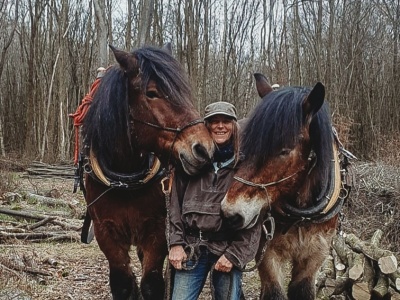
Herbs, History and Horses - a guide to low impact woodland restoration
- Ashford, Kent
- 24 Apr 2025


*Read the results of our survey here*
Networks for Resilience is a collaboration of five national organisations, working in partnership to guide you on your woodland management journey. This exciting pilot project in the South West and East of England aims to create regional hubs providing support, training and networking opportunities for owners looking to bring their woodland into management.
Healthy woodlands increase biodiversity, are more efficient carbon stores, contribute to creating a sustainable UK timber production industry (reducing imported timber) and create a range of work in forest based industries. Whatever your goals are, we can support you on your journey that will benefit you, your woodland and the environment. Get in touch today!


- Only 7% of our woodlands are actively managed
- More than 80% of our wood is imported
- Many unmanaged woodlands are in decline, which can impact the biodiversity within them.

- is a living carbon store
- provides a habitat for critically endangered species
- can aid flood prevention
- can support a future towards sustainable forestry
- is a potential revenue stream
- could be a wellbeing and social hub.
The changes we make now are pivotal to the protection of endangered species (both flora and fauna) and ensure through collaboration that our woodlands can survive in a changing world. Recognising the importance of this, Grown in Britain, the Royal Forestry Society, The Sylva Foundation, Woodland Heritage and Small Woods have formed a partnership to guide woodland owners on a personalised journey that meets the objectives of why they decided to become a woodland owner and maximises the secondary benefits that include the biodiversity gains, a networked forestry industry and carbon sequestration.
- Small, fragmented and often isolated, woodlands
- Individuals carrying out management, often without help
- Time-frame of management benefits
- Economies of scale
- Shortage of skills and access to affordable training
- Lack of centralised support and advice
- Removal of grant incentives for management
- Lack of contractors willing to manage small woodlands.
Our dedicated woodland network officers in the South West and East of England* are your first point of contact for support. After assessing your aims for your woodland, type of woodland and your experience we put together a personalised package of support that blends the most appropriate partner collaboration of training, membership and services to help you bring your woodland into active management.
If you don’t fall into one of the pilot regions, don’t worry! We anticipate on successfully meeting the objectives of the project we can roll the project out across the UK.
*South– West (Bristol & Avon, Cornwall, Devon, Dorset, Somerset, Wiltshire), East of England (Bedford, Cambridgeshire, Essex, Norfolk, Suffolk)
- A single online access point of services offered by the partner organisations
- Simplifying woodland management via the myForest software platform from the Sylva Foundation
- Regional support networks where owners and managers can share experiences and knowledge towards a collective approach to management
- Training and demonstration to facilitate self-sufficiency in woodland management and product development
- Encouraging landowners and managers in bringing their sites into management, through supporting the development of management plans, advice, support and training
- Help to break down barriers for local products into added value markets, replacing imports, supporting management of neglected woods and boosting supplies for local and regional primary and secondary processors.